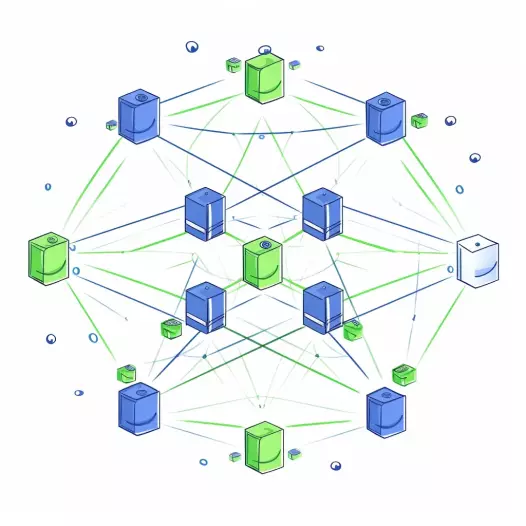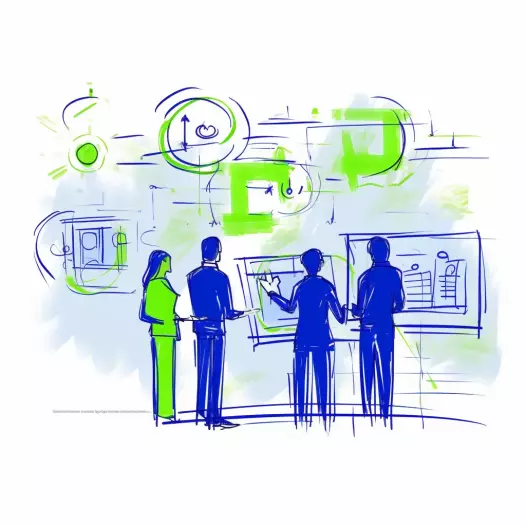How scalable is your cloud strategy?
Cloud computing offers agile scalability, cost efficiency, and location-independent data access. With our expertise, you maximize digital innovations and increase competitiveness. Rely on our team to drive your transformation to cloud technologies. Let's unlock the potentials of digitalization together.
Talk to UsCloud Computing at axxessio
Business Applications
With Cloud Business Applications, companies maximize their efficiency and flexibility. These tailor-made software solutions in the cloud offer scalable applications for various business areas.
Migration & Modernization
Adapt your IT structure to flexibly respond to changing requirements. Migration & modernization in the cloud allows for effective use of current technologies and thus promotes sustainable growth and competitiveness.
DevOps / DevSecOps
DevOps integrates development & operation for fast, efficient software deployment.
DevSecOps: Security as an integral part of all DevOps processes.
Quality Management & Testing
In cloud computing, quality management and testing are becoming increasingly important to ensure the security, scalability, and performance of applications and thus ensure business success.
Business Application using Cloud Computing
In today's digitized business world, Business Applications have become indispensable. They act as the backbone of many business processes and enable companies to work more efficiently, meet customer expectations, and gain competitive advantages.
Cloud Computing
The shift of business applications to the cloud has triggered a revolution in the business world. Cloud-based applications offer companies unprecedented scalability, allowing them to adapt to growing business requirements. They also enable considerable cost savings by avoiding expensive on-site infrastructure.
Mobility
With the constantly growing need for flexibility, the mobile use of business applications is indispensable. They enable employees to access important business information on the go, which increases productivity and ensures constant connectivity.
Artificial Intelligence
The integration of AI in business applications is a growing trend. AI tools offer advanced analytics, automation, and personalized user experiences that go far beyond the capabilities of traditional systems.
Customizability
No company is the same. Therefore, many companies are looking for business applications that can be tailored to their specific requirements. This trend towards customizability allows companies to have systems that are precisely tailored to their processes and business models.
Migration & Modernization in the Cloud
In a holistic approach, we transfer your existing IT resources to the cloud. At the same time, we optimize your applications and systems accordingly. The goal: increase in efficiency, scalability and cost savings. Through this strategic transformation, you become more agile, more powerful and remain competitive in the digital era.
Fast, Secure, Successful: How DevOps Transforms Your Development Processes
Integration of Development and Operation
DevOps combines development and operation to increase the efficiency, speed, and security of software development compared to traditional processes. A more agile software development cycle gives companies a competitive advantage.
Core Principles of DevOps
The methodology is based on four key principles, focusing on automation, collaboration, continuous improvement, and user needs. These principles promote better code quality, faster market launch, and more effective application planning.
Phases of DevOps Development
The development of DevOps goes through four phases, from individual tool selection to the introduction of a DevOps platform. This platform provides better visibility and control over all phases of the development cycle by bringing all teams together.
Benefits of a DevOps Culture
The adoption of a DevOps culture enables companies to increase operational efficiencies, deliver better products faster, and reduce risk in terms of security and compliance. The focus is on continuous improvement and the ability to respond flexibly to market changes.
DevSecOps: Security as an integral part of the software lifecycle
-
Integration of Security
DevSecOps emphasizes seamless integration of security aspects throughout the entire development lifecycle. Unlike traditional approaches where security is often treated as an afterthought, DevSecOps focuses on considering security from the very beginning. - Collaboration and Communication
A central principle of DevSecOps is the promotion of collaboration and communication between the development teams, security experts, and operational staff. This integrative approach allows security concerns to be addressed in real time and collaborative solutions to be developed. - Cultural Change Towards Shared Responsibility
DevSecOps promotes a cultural change where security is not only taken over by specialized teams, but is considered a shared responsibility of all stakeholders involved in the development process. Everyone is encouraged to proactively contribute to security.
Quality Management & Testing
In a world where more and more companies are moving their data and applications to the cloud, QA Testing is gaining importance. This specialized form of software testing ensures that cloud-based systems and applications operate efficiently, securely, and without errors to meet business requirements.
Why companies should test their cloud software
-
Scalability
While the cloud offers impressive scalability, it is not without its own challenges. An unforeseen increase in traffic or user requests can lead to bottlenecks or performance issues if the system has not been adequately tested and optimized. Targeted testing can identify and resolve such problems before they impact the end-user experience. -
Cost Efficiency
Implementing a cloud solution can be costly, especially if errors occur after implementation. Such errors can lead to operational interruptions, data loss, or security breaches that are expensive to fix. Thorough testing beforehand can avoid many of these problems and reduce the overall cost of the cloud implementation. - Security and Compliance
The cloud environment brings unique security risks. The threat of data leaks, unauthorized access, or other threats requires special caution. Comprehensive testing can identify and close security gaps. This is especially important for companies in industries with strict compliance requirements, as they need to ensure that their cloud solutions meet these standards.
Security in Cloud Computing
The ongoing digitalization has led more and more companies to move their data and applications to the cloud. While the benefits - such as scalability, flexibility, and cost efficiency - are clearly recognizable, questions about security also arise. A solid understanding and proactive management of security aspects in the cloud are essential for companies to draw the maximum benefit from their cloud initiatives.
Data Encryption
A central concern when using the cloud is data security. It is crucial that data is securely encrypted both during transmission (while it is being sent over the Internet) and at rest (while it is stored in the cloud). Effective encryption prevents unauthorized individuals from gaining access to confidential information, even if they have physical access to a storage location.
Identity and Access Management (IAM)
With IAM, companies can control who has access to certain resources in the cloud. This system allows identifying individual users or groups of users and assigning them specific access rights to resources. An effective IAM strategy ensures that only authorized individuals have access to data and applications and that this access is limited to what is necessary.
Endpoint security
While the data and applications in the cloud may be protected, there is still a risk that endpoints - such as employee laptops or mobile phones - may be compromised. It is crucial to secure these devices as they are often used as access points to the cloud.
Network Security
This refers to the protection of a computer network from intruders, whether they are targeted hackers or opportunistic malware. When using the cloud, it is essential to carefully monitor and control the traffic going in and out of the cloud to identify and shield potential attack vectors.


























